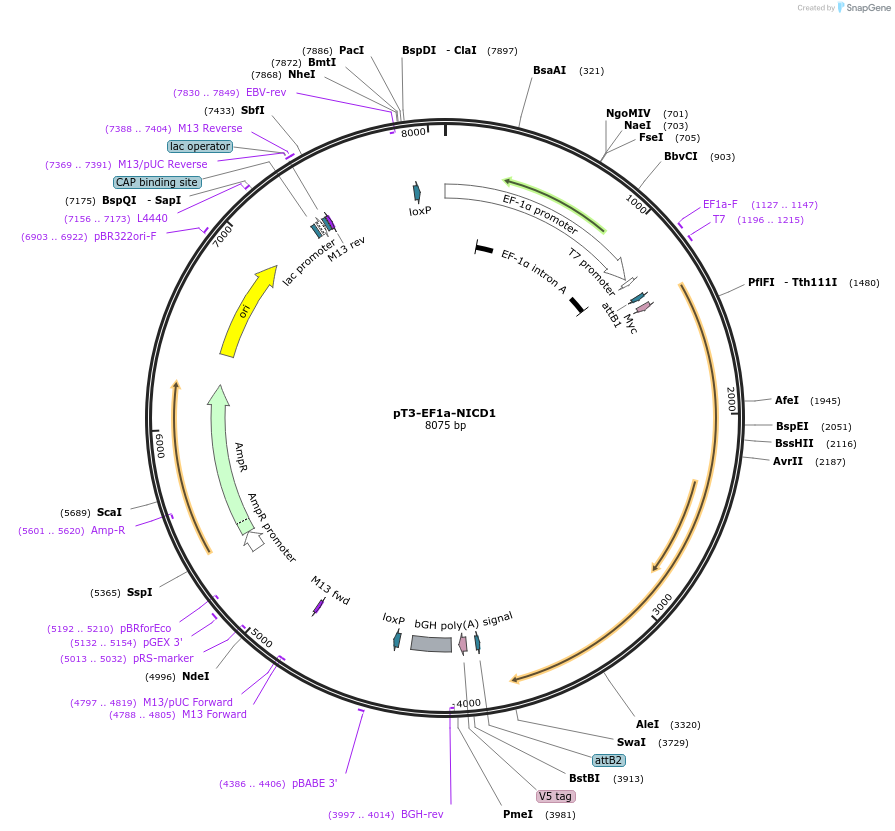-
Depositing Lab
-
Sequence Information
Ordering
| Item | Catalog # | Description | Quantity | Price (USD) | |
|---|---|---|---|---|---|
| Plasmid | 46047 | Standard format: Plasmid sent in bacteria as agar stab | 1 | $89 | |
Backbone
-
Vector backbonepT3-EF1a
- Backbone size w/o insert (bp) 7000
-
Vector typeMammalian Expression
Growth in Bacteria
-
Bacterial Resistance(s)Ampicillin, 100 μg/mL
-
Growth Temperature37°C
-
Growth Strain(s)DH5alpha
-
Copy numberUnknown
Gene/Insert
-
Gene/Insert nameNotch1 (C-term)
-
Alt nameNotch 1
-
SpeciesM. musculus (mouse)
-
Insert Size (bp)2385
-
MutationCytoplasmic domain initiating at amino acid 1753
-
GenBank ID
-
Entrez GeneNotch1 (a.k.a. 9930111A19Rik, Mis6, N1, Tan1, lin-12)
- Promoter EF1a
-
Tag
/ Fusion Protein
- Myc tag (N terminal on insert)
Cloning Information
- Cloning method Gateway Cloning
- 5′ sequencing primer T7
- (Common Sequencing Primers)
Resource Information
-
Addgene Notes
-
A portion of this plasmid was derived from a plasmid made byNotch 1 from Addgene plasmid 15131: pLIA mNIC myc.
-
Articles Citing this Plasmid
Terms and Licenses
-
Academic/Nonprofit Terms
-
Industry Terms
- Not Available to Industry
Trademarks:
- Zeocin® is an InvivoGen trademark.
Depositor Comments
This plasmid is in the pT3-EF1a vector which contains loxP sites flanking the inverted repeats of SB (sleeping beauty) sequence. Therefore this plasmid cannot not used with Cre for in vivo studies.
For in vivo use in mice with Cre, please use plasmid 86500.
These plasmids were created by your colleagues. Please acknowledge the Principal Investigator, cite the article in which the plasmids were described, and include Addgene in the Materials and Methods of your future publications.
-
For your Materials & Methods section:
pT3-EF1a-NICD1 was a gift from Xin Chen (Addgene plasmid # 46047 ; http://n2t.net/addgene:46047 ; RRID:Addgene_46047) -
For your References section:
Cholangiocarcinomas can originate from hepatocytes in mice. Fan B, Malato Y, Calvisi DF, Naqvi S, Razumilava N, Ribback S, Gores GJ, Dombrowski F, Evert M, Chen X, Willenbring H. J Clin Invest. 2012 Aug 1;122(8):2911-5. doi: 10.1172/JCI63212. Epub 2012 Jul 17. 10.1172/JCI63212 PubMed 22797301



